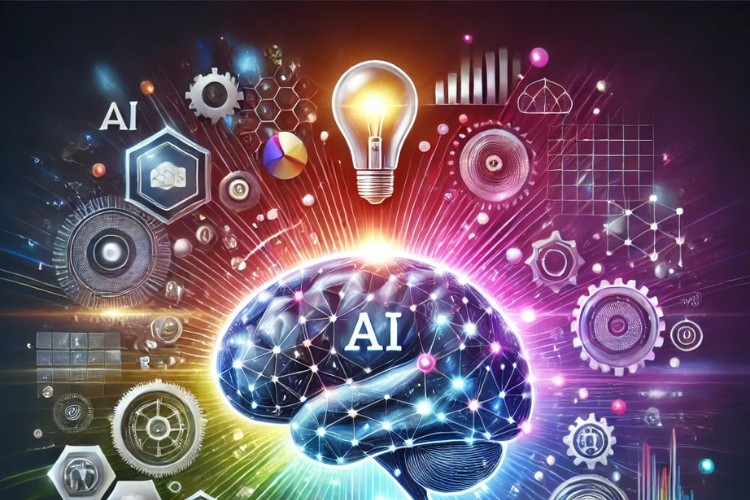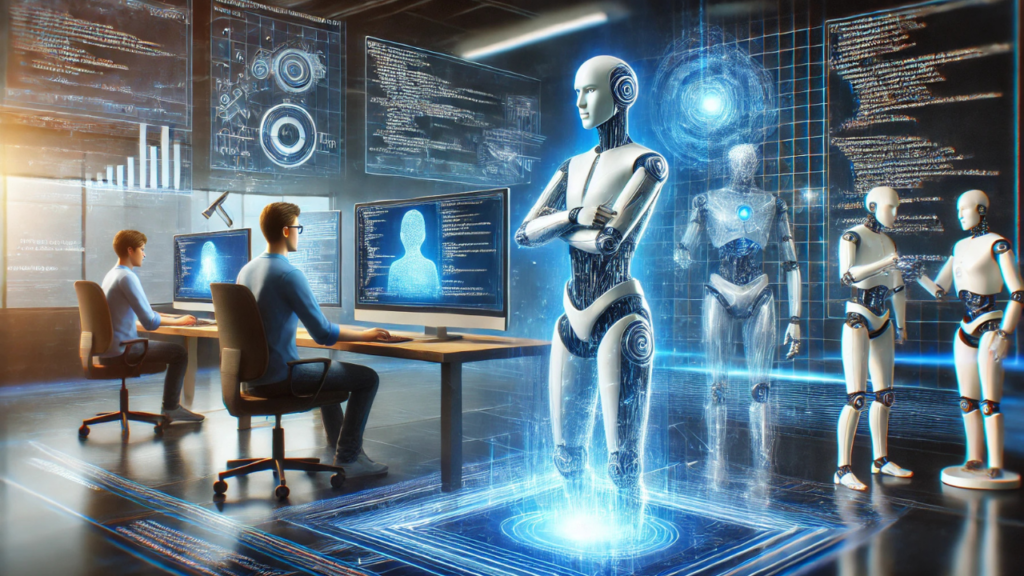Introduction
Artificial intelligence (AI) is transforming industries worldwide, and software development is no exception. While some fear that AI will replace developers, the reality is quite the opposite. AI is a tool designed to enhance a developer’s capabilities, not diminish them. By automating mundane tasks, AI allows developers to focus on innovation and problem-solving. This blog explores five critical roles AI plays in shaping the future of software development.
AI has the potential to redefine how developers approach their work. From smarter coding processes to fostering better collaboration, AI is becoming an indispensable part of the development toolkit. Let’s delve deeper into the transformative roles AI plays in modern software development and why embracing it is crucial for every developer.
1. Enhancing Productivity and Efficiency
AI excels at automating repetitive tasks, enabling developers to dedicate their time to more creative and complex work. Tools like autocompleters and intelligent debuggers have revolutionized how developers approach coding. For instance, AI-powered platforms such as GitHub Copilot can suggest entire lines of code, reducing the need for manual input.
This boost in efficiency leads to faster project completion and higher-quality outputs. Developers no longer need to spend hours debugging lines of code or rewriting repetitive segments. Instead, they can focus on designing scalable solutions and enhancing user experiences. Embracing these tools can drastically improve a developer’s workflow.
Moreover, AI-driven task automation ensures consistency across projects. Tasks like code formatting, unit testing, and version control are streamlined, leaving little room for error. This ensures that the final product adheres to industry standards while saving time and resources.
2. Smarter Coding with AI-Powered Tools
AI simplifies coding by making it smarter and more efficient. Intelligent tools help developers write, debug, and optimize code seamlessly. For example, AI-powered platforms like TabNine and Kite provide real-time code suggestions tailored to the developer’s specific needs.
Debugging has also become more precise with AI. Tools like DeepCode analyze codebases to identify bugs and vulnerabilities, often suggesting fixes instantly. These advancements reduce human error and ensure the code’s robustness. Developers can now allocate more time to designing software architectures and addressing complex challenges rather than spending time troubleshooting.
By incorporating AI, developers can produce cleaner, more efficient code while minimizing downtime. This ensures projects are delivered on schedule without compromising quality.
In addition to debugging, AI facilitates code optimization. Developers can use AI to analyze performance bottlenecks and suggest improvements. This is particularly useful in large-scale projects where performance is critical. AI tools can also assist in predicting potential issues during the development phase, ensuring a smoother deployment process.
3. Personalized Learning and Skill Development
The tech landscape evolves rapidly, and staying updated is essential for every developer. AI plays a pivotal role in personalized learning by recommending tailored resources, tutorials, and documentation. Platforms like Coursera and Udemy use AI to suggest courses based on a developer’s learning history and goals.
This approach ensures that developers remain at the forefront of technological advancements. Whether it’s mastering a new programming language or understanding cutting-edge frameworks, AI makes learning more accessible and efficient. By leveraging AI, developers can adapt to new tools and methodologies faster than ever before.
Personalized learning also fosters continuous professional growth. Developers who embrace AI for skill enhancement are better prepared to tackle future challenges, making them invaluable assets to their teams and organizations.
AI doesn’t just recommend resources—it also tracks progress. Platforms can identify knowledge gaps and suggest targeted learning materials to fill them. This ensures a comprehensive learning experience that aligns with career goals. Additionally, AI-driven mentoring systems can simulate real-world scenarios, providing hands-on experience without the associated risks.
4. Improving Collaboration and Communication
Collaboration and communication are crucial in software development. AI-powered tools streamline these processes, ensuring teams work more effectively. Project management platforms like Jira and Trello now use AI for intelligent task assignment, progress tracking, and automated updates.
AI also enhances communication through tools like Slack and Microsoft Teams. Features such as automated meeting summaries and real-time language translation ensure that team members stay aligned, regardless of location. This is especially beneficial for remote and distributed teams.
Efficient collaboration results in better project execution and reduced misunderstandings. Developers can focus on delivering exceptional results rather than managing logistical challenges.
Additionally, AI can analyze team workflows to identify bottlenecks and suggest improvements. For example, AI-powered analytics can highlight underperforming areas in a project and recommend actionable solutions. This proactive approach ensures that projects stay on track and meet deadlines.
5. Unlocking Innovation with AI
AI is not just a tool for improving existing workflows; it’s a catalyst for innovation. By automating routine tasks, AI frees developers to think creatively and explore uncharted territories. Whether it’s developing advanced algorithms or experimenting with new technologies, AI provides the support developers need to innovate.
For example, AI-powered simulations can help developers test software in various scenarios without extensive manual setup. This leads to faster prototyping and a deeper understanding of potential challenges. Additionally, tools like TensorFlow and PyTorch enable developers to build and deploy machine learning models seamlessly.
Developers who embrace AI gain a competitive edge, as they can tackle complex challenges with confidence. The future of software development lies in leveraging AI to unlock new possibilities and drive transformation in the tech industry.

AI also fosters innovation by enabling cross-domain applications. Developers can use AI to integrate solutions from different industries, such as healthcare, finance, and education, creating groundbreaking applications. This interdisciplinary approach expands the scope of what’s possible with technology.
Conclusion
AI is revolutionizing software development by enhancing productivity, enabling smarter coding, fostering personalized learning, improving collaboration, and unlocking innovation. Instead of viewing AI as a threat, developers should embrace it as an opportunity for growth and transformation.
By integrating AI into their workflows, developers can stay ahead in an ever-evolving industry. The key to success lies in leveraging AI as a partner, not a competitor. The future of software development belongs to those who harness the power of AI to create, innovate, and excel.
For developers, AI isn’t just a trend; it’s a necessity. As the industry evolves, those who adapt and embrace AI will be at the forefront of innovation. The possibilities are endless, and the potential for growth is unmatched. Now is the time to integrate AI into your development practices and be a part of the technological revolution. Platforms like StartupHakk also highlight how AI is shaping the future, ensuring developers remain informed and prepared for what lies ahead.




